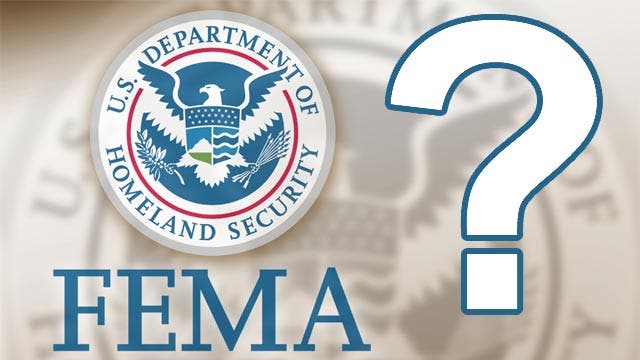Is it time to wean ourselves off of FEMA?
Rick Sanchez on the federal government's response to natural disasters and why we need an alternative
Rape is a strong word. It elicits an intense reaction and gets our attention —which is exactly what my colleague Charles Krauthammer did while making a point about whether we should automatically hand over $60 billion dollars for the Hurricane Sandy relief bill.
"I think what Boehner did in postponing the vote until today was absolutely right," Krauthammer said on Special Report. "That was a rape of the Treasury. $60 billion, including a ton of pork. The part that was essential that passed today was to replenish the flood insurance. That's right, and the rest ought to be debated in regular order."
On the other side, there's New Jersey Governor Chris Christie. Always the deficit hawk, Christie is going the other way on this one and he's taking no prisoners. Just ask John Boehner, who is being eviscerated by the New Jersey Governor. Christie wants our money and he wants it now.
"There is only one group to blame for the continued suffering of these innocent victims: the House majority and their speaker, John Boehner," said Christie. But since when is the Speaker of the House responsible for weather patterns?
Krauthammer's argument (which I agree with) and Christie's (which I don't) is about the divide between government assistance and dependency. One is nice to have; the other you can't live without. One is appreciated; the other is expected. One is an add-on to what we can do for ourselves; the other makes us less apt to fend for ourselves.
I learned this lesson in 1992 while covering Hurricane Andrew. My coverage was heralded by President George H.W. Bush and the Florida Association of Broadcasters, but it wasn't really about what I did as much as it was about what we did.
Back then there was no expectation that after a disaster FEMA was solely responsible for our welfare. So even though Andrew was, at the time, "the worst and most expensive natural disaster in U.S. history, we felt responsible for our own welfare.
The day after Hurricane Andrew hit, flying in a helicopter into the heart of the devastation, I was struck by what truly resembled a war zone. Not a single building was standing in parts of Florida City, Homestead and huge swaths of South Dade. It was as if a mega ton bomb had ripped every home from its foundation, leaving in its place instead vessels from an ocean miles away, both large and small.
Upon landing I was approached by frightened, crying parents clutching their kids and wondering what would happen to them. Not knowing what to say, I reluctantly told them "everything would be OK."
But FEMA was nowhere in sight, it was just us, standing amid the devastation wondering where would we begin, where would we turn? That moment, after wiping my own tears, I went on the air and reported simply: "These people need help." Then I reported what they needed, specifically "baby formula in Old Cutler, building supplies in Country Walk, bottled water in Naranja."
Within hours, whatever I asked for seemed to be on the way. Ferried by cars, trucks and even planes from centralized locations in other parts of Florida unaffected by Andrew, the shipments kept coming. For two weeks straight, we stayed on their air coordinating one of the most comprehensive unofficial relief efforts in Florida history. It was about neighbors helping neighbors —people hearing of a need, making a promise to help and fulfilling it. In the end, we moved an estimated 60,000 tons of supplies. Without FEMA.
Would we have done the same if we assumed it were somebody else's job? Would we have just assumed it was the government's responsibility? Would we have acted as quickly, or would we have waited for FEMA and FEMA funds? Would truckers, mechanics, pilots and business owners have stopped everything they were doing? Would they have rolled up their sleeves and gone to work for free, or would they have waited to get a check or even the promise of a check from FEMA before shipping or hauling supplies?
I would like to think the answer to those questions is no. But my sense is that we are slowly being conditioned to think that all we need is FEMA and that only the government can or will provide. FEMA is part of the answer, but not the entirety of it.
Just as with Andrew, Hurricane Sandy brought together devastated communities. We saw the power of neighbors helping neighbors, the power of volunteering, the generosity of people giving to those most in need. We saw millions of dollars raised in telethons and through charities. People took in those who had lost everything. It was moving and inspiring to see the best in people emerge. It reminded me of what I saw during Hurricane Andrew.
And that's what must not get lost in this political debate. For while there is no question we should encourage the government to help our neighbors in a time of need, encouragement can turn into expectation and, worse, dependency —and we will not be better for it.









































